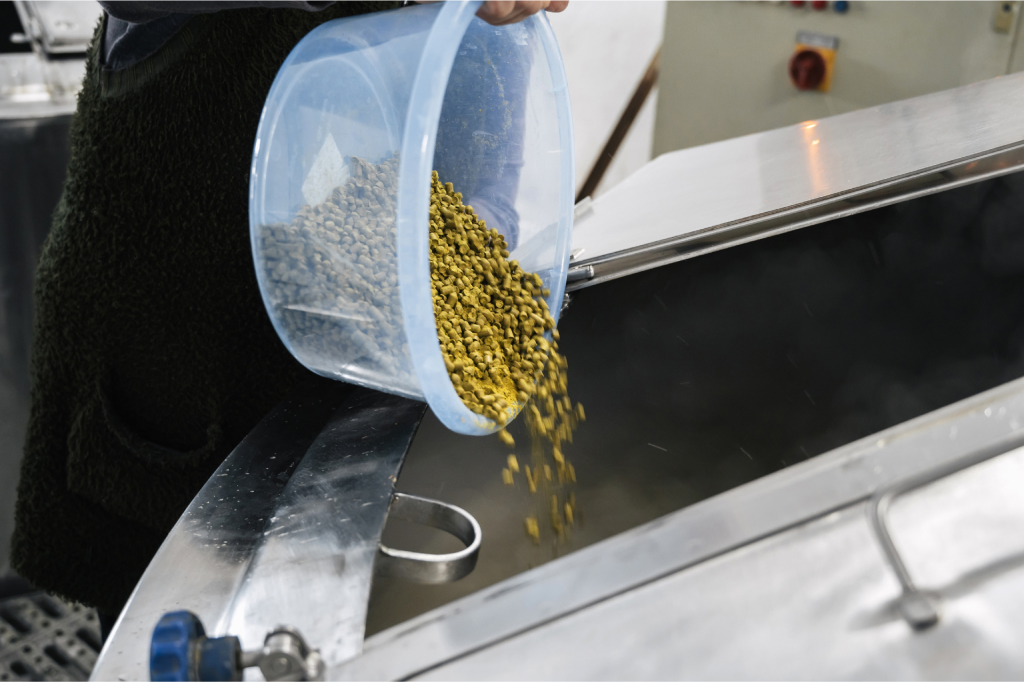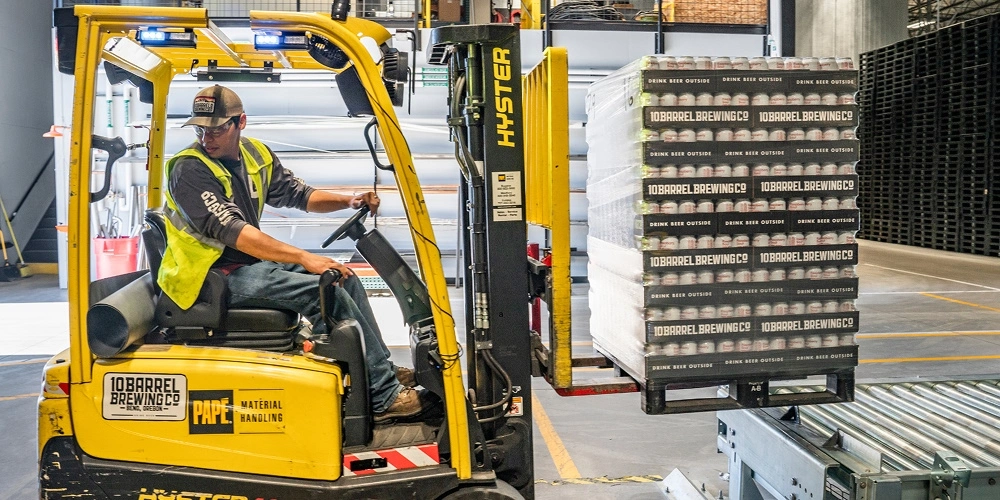Table of Contents
Join our
Mailing List
Stay up-to-date with BREW MOVERS latest news and service offerings.

Brewery Sustainability: 5 Actionable Tips for Craft Brewers
Published Date: 03 April 2023
Craft beer has been on the rise in recent years—and for good reason.
Not only are small-batch brews delicious and unique, but they’re also becoming increasingly eco-friendly. As consumers become more environmentally conscious, many breweries are adopting green practices to meet the demand for sustainable beer production. From cutting waste and increasing energy efficiency to promoting sustainable packaging and supply chains, there are many ways brewers can reduce their environmental impact.
With Earth Day just around the corner, there’s no better time to examine the environmental impact of beer production, the brewing process, and how brewers can promote sustainability to generate a better bottom line. Then, we’ll raise a glass to a more sustainable future for our favorite craft brews.
What is Brewery Sustainability?
Brewery sustainability is about finding innovative ways to reduce environmental impact while still creating excellent beer. By adopting sustainable practices, the brewing industry can minimize adverse environmental effects like greenhouse gas emissions and water demand.
Given the growth of the brewing industry, it’s essential to work towards reducing our environmental footprint. Not only that, but sustainability can also cut costs and improve efficiency, elevating the bottom line.
The impact of sustainable brewing may seem small, but collectively, we can make a significant difference in the world.

Image source: Canva
The Environmental Impact of Beer Production
Beer production is a fascinating process that has evolved over centuries. From selecting the best quality ingredients to brewing and fermentation, there are many steps involved in creating the perfect pint.
However, it’s not just the taste that’s important: the environmental impact of beer production is also a critical consideration. In particular, the brewing process has a significant carbon footprint primarily from the high energy consumption required to heat brew kettles and maintain the right temperature throughout fermentation.
Here are the various environmental impacts of brewery operations:
- Greenhouse gas emissions: Beer production involves emitting large amounts of carbon dioxide (CO2) and other greenhouse gasses, primarily during the brewing process and transportation of raw materials and finished products.
- Water consumption: A significant amount of water is used when brewing beer and cleaning equipment. Water usage varies depending on the method and location of production, but always has an impact.
- Energy use: Beer production process requires a lot of energy, primarily for heating and cooling during brewing. The energy source used can affect the carbon footprint of beer making.
- Waste generation: Brewing generates large amounts of waste, including spent grains, hop residue, and wastewater. If not handled properly, it can lead to environmental pollution and resource depletion.
As consumers become more environmentally conscious, breweries should explore ways to reduce their carbon footprint with sustainable production methods and packaging. Despite the challenges for brewery owners, there are a number of ways to positively impact the world while making delicious, sustainably brewed beer.
5 Tips For Sustainable Beer Production
Tip #1: Reduce Water Usage During the Brewing Process
Water is an essential ingredient in any beer process, but can be easily wasteful if not adequately managed. As a craft brewer, you can reduce your water usage during the brewing process by investing in energy-efficient equipment and using recycled water whenever possible. Additionally, keep track of your water usage throughout each step of the brewing process to identify opportunities to limit waste.
Tip #2: Boost Product Transportation Efficiency
Transporting product from brewery to consumer requires large amounts of energy, contributing significantly to a brewery’s carbon footprint. Many craft brewers use trucks or other fossil-fuel-powered transportation when delivering products to customers.
To reduce your carbon footprint, look for ways to improve transportation efficiency by optimizing routes and consolidating shipments whenever possible. Less than truckload (LTL) shipping is a great solution for transporting small loads or quantities, this is because multiple shippers can use the same truck to transport their goods.
You can also consider alternative transportation options, such as electric vehicles or bikes for short-distance deliveries, or, using alternative fuels such as biodiesel can further reduce the carbon emissions related to transportation.

Image source: Canva
Tip #3: Move Away from Unsustainable Agriculture Practices
Craft beer often uses ingredients sourced from agriculture practices that aren’t particularly sustainable for the environment. For example, hops are often grown in monocultures requiring large amounts of water and synthetic fertilizers to maintain yield.
To avoid unsustainable agricultural practices, look into sourcing ingredients from local farms that use organic farming techniques or regenerative agriculture practices such as cover cropping and no-till farming. These methods support biodiversity and soil health.
Moreover, by using sustainable ingredients in their products, craft brewers can reduce their environmental impact and better appeal to environmentally conscious consumers looking for sustainably-made products.
Tip #4: Invest In Renewable Energy
Breweries rely heavily on energy for everything, from heating systems to lighting and refrigeration units—all of which contribute significantly to a brewery’s carbon footprint. Consider installing solar panels in your facility or switching to renewable energy sources such as wind power or geothermal systems. These renewable energy sources provide clean energy at lower costs than traditional power sources.
Switching existing equipment over to more efficient models is another great way for breweries to save money while reducing carbon emissions. Additionally, consider purchasing offsets for any emissions generated by your brewery’s operations and those associated with transporting products to consumers.
Tip #5: Adopt A Circular Business Model
Businesses are turning away from linear models that rely on “take-make-dispose” cycles in favor of circular business models. Circular business models reuse waste materials rather than throwing them away in landfills or burning them using incinerators. These models encourage closed-loop production processes where materials are sourced and reused locally through collaboration between businesses within a specific geographic area.
For craft brewers, this could mean reusing spent grain as animal feed or compost, repurposing bottles or cans, or collaborating with local farmers and community gardens to put spent grain toward soil regeneration efforts. By implementing a circular business model at your brewery, you can reduce waste while increasing efficiency and profitability.
A Pallet Parka is a great way to keep your product cold on the move that can be used over and over again. By negating the need for refrigeration by dry shipping, they also limit the amount of energy expended during cold chain shipping.
Survival of the Greenest: Adapting to a Changing Climate
As we face the consequences of climate change, we must take a closer look at the environmental impact of beer. Eco-brewing is not just a trend, but a necessity for breweries wanting to survive in a changing climate.
Sustainability practices help reduce our carbon footprint and create opportunities for innovation and differentiation in the market. By investing in brewery sustainability practices, owners can reduce their energy usage, water consumption, and waste to benefit the environment while efficiently improving their bottom line.
Green breweries are the future—the time is now to make the shift. Contact us now to learn more about how to integrate sustainability best practices with beverage managed logistics.




